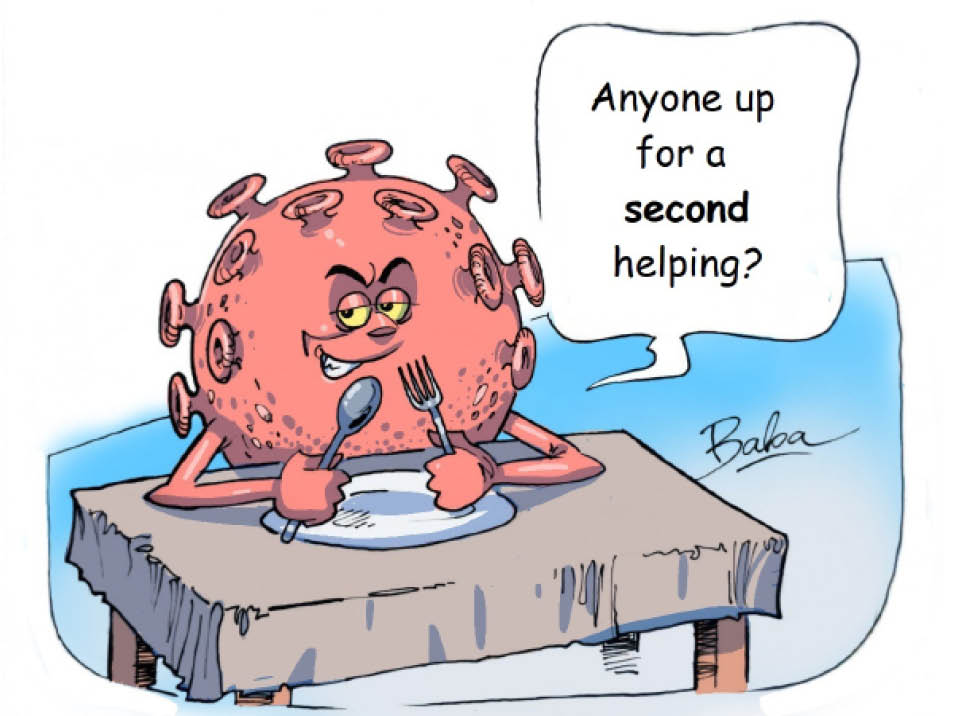Not that Covid-19 ever went away. But now that it appears to have returned to Nigeria, will those of us who downplay its deadliness or even deny its existence change their minds? I honestly don’t think so. Not easily, anyway. Many Nigerians roam around their ‘normal’ lives, sans masks or any other social distancing measures. Many of them believe the pandemic is ‘over’ in this country.
But try telling that to Chief of Army Staff Lt. Gen. Tukur Buratai and other senior officers of the Nigerian Army who attended the COAS Annual Conference – and are currently on a 14-day isolation following the death of Maj. Gen. Johnson Olu Irefin, the GOC of 6 Division, Port Harcourt, reportedly of COVID-19 complications. For them, the danger is very real. The security implications of such a potential spread can only be imagined.
After cancelling the COAS Annual Conference – where the late Irefin was also in attendance – Buratai also did a most ‘un-Nigerian’ thing, asking guests invited for the wedding of his son not to attend. I say ‘un-Nigerian’ because these days, big events are the norm. Dinners, wedding parties, awards shows, and even concerts. All well-attended, and with robust guest lists. Yes, many of them have attendees wearing masks and observing social distance, but a good number don’t. This is why the sharp spike in infections across states is sending experts into a fit.
The Federal Government came out guns blazing a couple of days ago, with SGF Boss Mustapha rather bossily – and rightfully so – accusing religious leaders of sabotaging the national response in containing the spread of Covid-19 by holding large gatherings. Now, I haven’t seen a response from any religious leader, and to be fair the label is fairly general. But the threat is real, and not limited to places of worship. Markets, schools, businesses, and so on. The crippling effects of lockdown are still being felt globally, and granted, a gradual reopening will help economies and livelihoods begin a journey back to normalcy.
Also the Chairman of the Presidential Task Force on Covid-19, Mustapha added that his task force will submit its final report to President Muhammadu Buhari. This is from an official who had commendably said: “The pandemic still has a long a way to run and decisions made by leaders and citizens in the coming days will determine the course of the next days and months.” I’m here scratching my head, though, over how a task force like his would be handing in a ‘final’ report. It may be inadvertent, but wrong signals could be sent by that. Signals that could project a notion of ‘the pandemic is kind-of/sort-of over in Nigeria’, a notion that is patently false.
A problem that persists, is that of people who refuse to follow safety protocols while in public places. In fact, the few who do are looked at as weird or eccentric. Ever the media-favorite, Kaduna State governor, Malam Nasir El-Rufai has already threatened another lockdown in light of this second wave of infections. His reason? The state is experiencing a rising rate of infections, said to be hovering between a scary 20% and 35%. He also urged citizens to always wear masks in public and avoid crowded places and large gatherings. I mean, he certainly knows what he’s talking about, having survived Covid-19 himself.
A deep-rooted cynicism is responsible for the lackadaisical attitudes of Nigerians towards Covid-19. While it is unfortunate, it is also very possible to reverse it. This column has mentioned it twice before that more needs to be done in addressing citizens about the reality we face today. There are far too may Covid denyers and ‘Covidiots’ with internet access spreading lies and misinformation, for us to leave it all to chance.
The solution, whose execution might be epic, remains simple. The Federal Government needs to go back to the drawing board on managing the pandemic, palliatives (is that still a thing?), and vital information to avoid nasty spinoff tragedies like ‘palliative lootings’, violence and widespread distrust of government and its policies.
Even with the heartening news of a vaccine, and the glimmer of hope on the horizon that it will reach Nigeria by the beginning of 2021, skeptics are still rolling their eyes. This is more reason why government – at state and federal levels – shouldn’t be caught napping. There should also be well put-together strategies for its rollout, to avoid fresh problems, as information is key. There shouldn’t be even a whisper about selectiveness, which should be helped by transparent distribution processes.
As a final word, I want to restate that Covid-19 never went anywhere, and it is still infecting and killing Nigerians. Some of our most vulnerable citizens face the most risk, so we all need to be responsible. Wash hands regularly, use hand sanitizers, avoid large gatherings, and also wear masks in public. The truth is, the threat is still very much with us, and we have to take care of ourselves, and respect the rights of others to take care of themselves, too. While the following isn’t a maxim in Nigeria, it should be: Be smart and be safe.

 Join Daily Trust WhatsApp Community For Quick Access To News and Happenings Around You.
Join Daily Trust WhatsApp Community For Quick Access To News and Happenings Around You.


